While opinions really do vary, a lot of people have certain expectations about what their proposal will look like. The location, the planning, the outfits and, yes, the ring might be important. So if you’ve gone to all the trouble to get a really, really nice ring, chances are you might be unhappy when your partner barely touches it.
A man asked the internet for advice when he noticed that his fiancée had stopped wearing her rather expensive engagement ring. We reached out to the man who shared the post via private message and will update the article when he gets back to us.
An engagement ring is generally seen as a strong sign that someone has committed to marriage
Image credits: Hussein Altameemi / Pexels (not the actual photo)
So one man was concerned when his fiancée stopped wearing hers
Image credits: Sam Lion / Pexels (not the actual photo)
Image credits: Timur Weber / Pexels (not the actual photo)
Image credits: vaper12345
There are very practical reasons one might not wear rings at all
Not everyone is comfortable or practical enough to wear their engagement ring every single day, and that is fine. Some people may have work or daily regimens that make perpetual ring-wearing a no-go. Nurses and other healthcare workers are clear candidates for this but also chefs, construction workers, or anyone who has hands (and rings) subject to heavy usage may take off the ring to avoid damage, snagging, or hygiene concerns. In line or finger work where gloves are worn, a ring can be a risk to safety, and in sport or art pursuits, such as pottery, rock climbing, or weightlifting, it can interfere with grip or be painfully jammed. A temporary removal is often less relationship-focused and more ring-and-finger-preservation focused.
Physical comfort is another common reason. A finger that swells with warm weather, an allergy to a certain metal, or even a hand injury can cause a ring to become an irritation. Others simply aren’t used to wearing rings, finding them fiddly or restrictive, especially if they’ve never been “jewelry types.” They may also be concerned about slight weight changes or skin texture and wish to keep the ring out of sight until they feel more comfortable. We, unfortunately, don’t have enough information about that to speculate here, but it does not seem like the fiancée enjoys lots of jewelry, given her chosen profession.
For others, there’s an emotional or personal factor: wanting to be able to think of oneself independently of the status of a fiancée. Transitioning from “dating” to “engaged” is sometimes a shift in identity, and even if they love their betrothed, there are some who need time to process that transition in seclusion. They might choose a lesser-known band on a chain, keep the ring stashed at home, or merely wear it on holidays until they feel comfortable enough to have a constant reminder.
Communication is and remains key in any long term relationship
It takes honest, empathetic communication to understand and reconcile these decisions. If you’re the one who feels hurt or insecure when the ring falls off, explain to them in a relaxed tone: “I know you have practical reasons, but wearing the ring on your hand reminds me that we’re in this together.” Hear them out, maybe they’ve been bothered by greasy fingers after coming home from a long day of work or scared of losing the ring while out and about. Acknowledging that you listen to their complaints shows respect for their autonomy and care for their comfort.
From there, consider compromises that satisfy both partners’ needs. Perhaps they can wear the ring on date nights and family events, but stash it in a secure location during work hours or vigorous exercise. If the ring’s physical style is the issue, a temporary silicone band or a second “placeholder” ring will signal commitment without sacrificing functionality. Others would rather wear a pendant version of the ring suspended from a chain, keeping the actual ring in a secure box while continuing to keep its significance near to heart. The man seems to believe that the amount he spent on the ring should, in some way, affect her decision making. If anything, this should be a red flag to her, if he believes that money equals this sort of entitlement.
Reassurance goes a long way too. Explain to your partner that the ring is symbolic, valuable because of what it means, not because of how brightly it glows. Inform them that you trust them to make their own decision, whether they wear the ring all day or keep it in a drawer, and reassure them that your love and commitment are not dependent on adornments. Over time, as the partners listen to one another and feel understood, the ring acquires a celebratory connotation and loses its anxiety component.
Engagement rings are personal matters, and not having one is not a do-one-for-all mandate. By recognizing the utilitarian and psychological reasons why someone has chosen to forgo the daily wear, and by offering empathy, flexible solutions, and genuine reassurance, couples can turn what could otherwise be a cause of contention into a means of building trust and increased understanding.
Some readers thought he really was overreacting
Some thought his concerns were valid
Thanks! Check out the results:


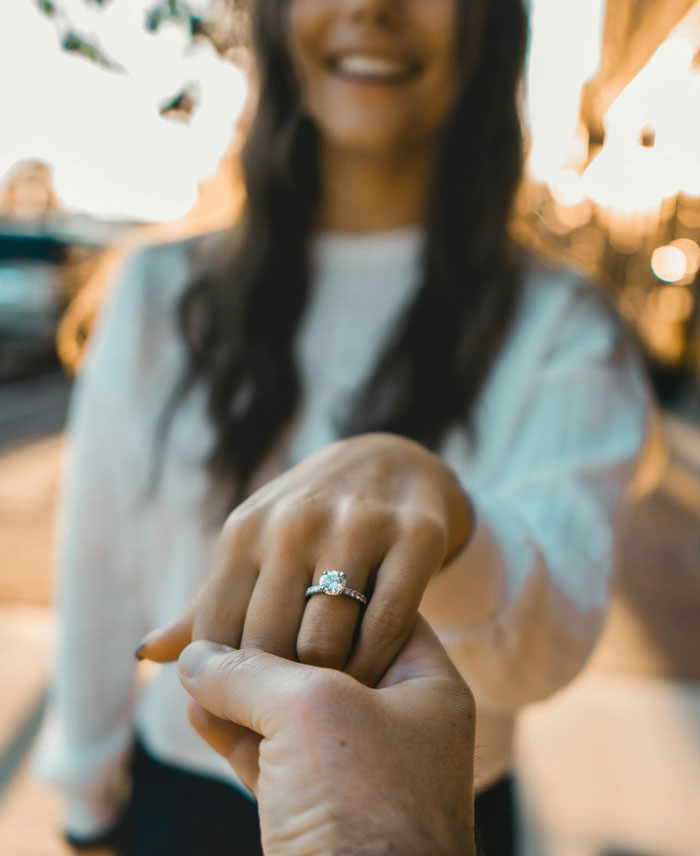
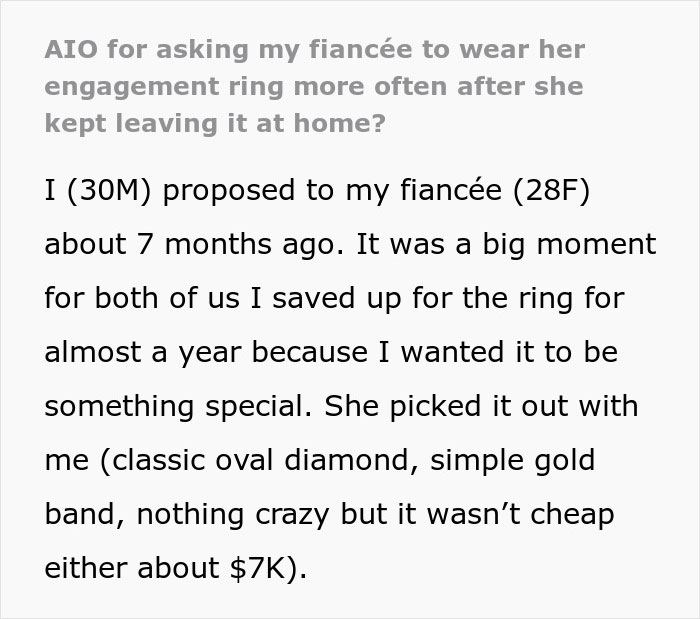
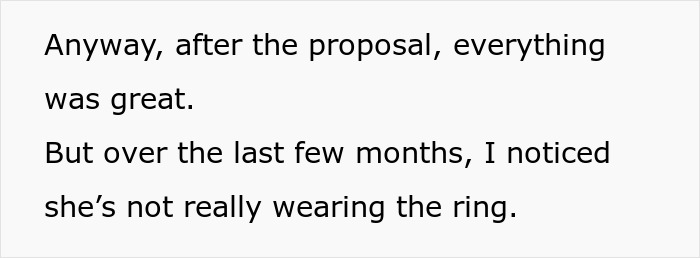
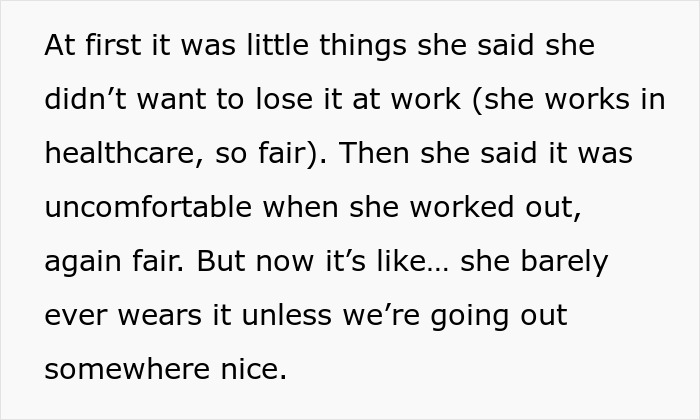


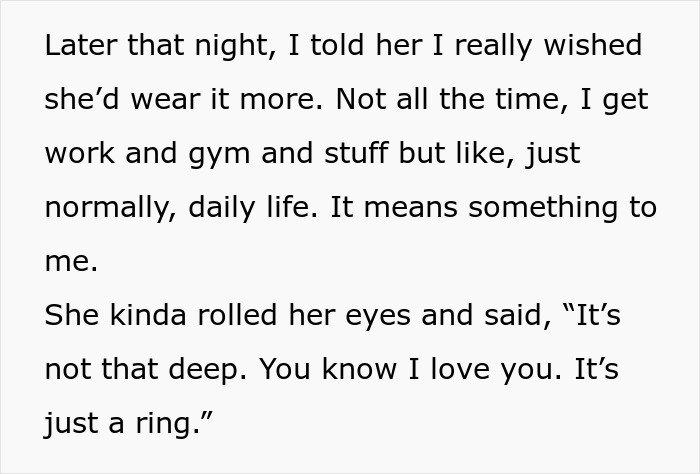
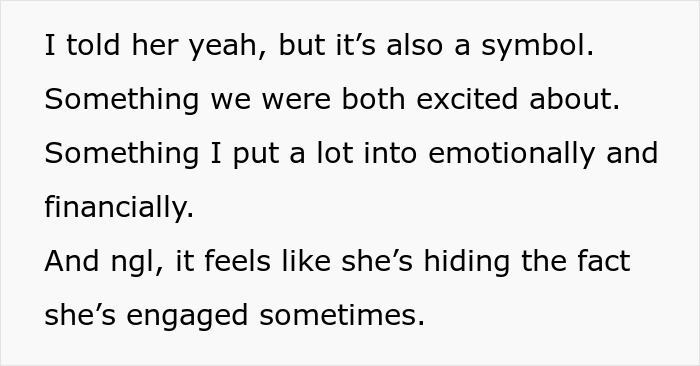

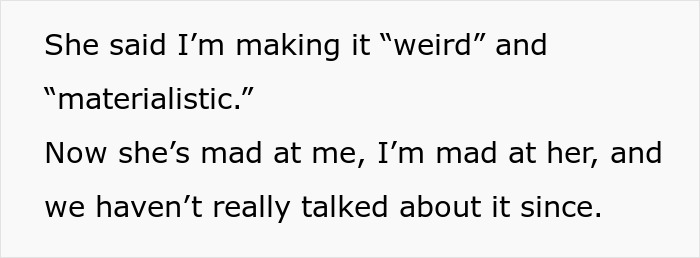
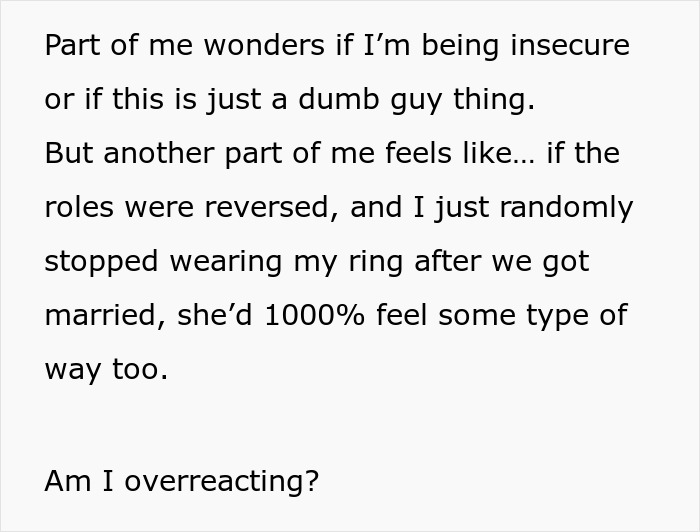
0 Comments